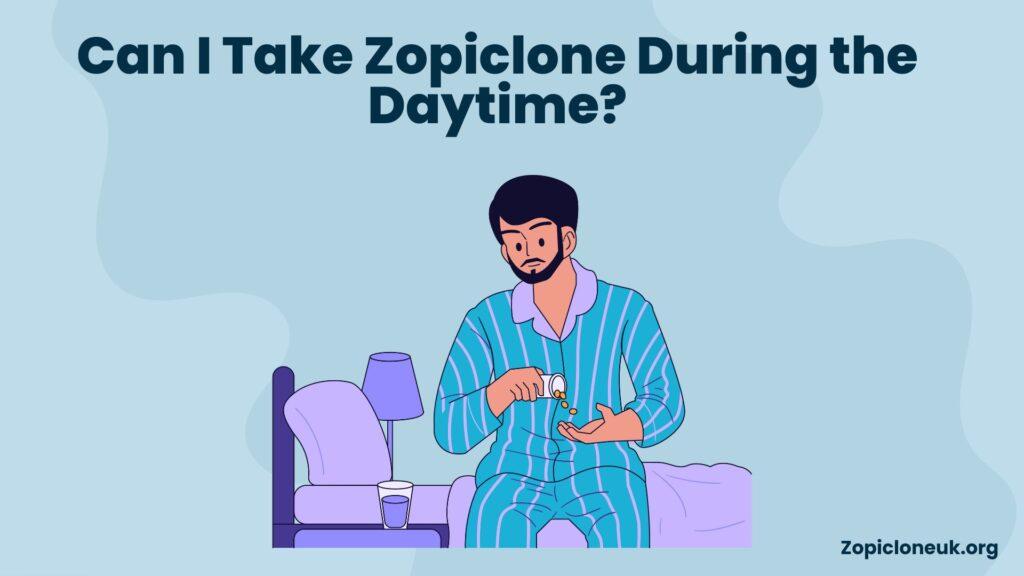
Can I Take Zopiclone During the Daytime:- Zopiclone, often marketed under brand names like Imovane and Zimovane, is a prescription medication commonly used for the short-term treatment of insomnia. While its primary function is to aid sleep, some may wonder about the feasibility and implications of taking Zopiclone during the daytime. This blog will delve into the reasons for taking Zopiclone, potential risks, and expert advice on its use during the day.
Contents
What is Zopiclone?
Zopiclone is a non-benzodiazepine hypnotic agent that acts on the central nervous system to produce a calming effect. It is used primarily to treat severe insomnia, helping individuals fall asleep faster and stay asleep longer. Zopiclone works by modulating benzodiazepine receptors, enhancing the effects of a neurotransmitter called GABA (gamma-aminobutyric acid), which promotes sleepiness and relaxation.
Common Uses of Zopiclone
- Short-term Treatment of Insomnia: Zopiclone is prescribed for individuals experiencing acute episodes of insomnia, typically lasting no more than a few weeks.
- Severe Insomnia: It is often used when insomnia is severe and significantly impacts daily functioning.
- Improving Sleep Quality: Zopiclone can help improve the quality of sleep, allowing for a more restful and restorative sleep cycle.
Why Consider Taking Zopiclone During the Day?
Taking Zopiclone during the daytime is not typically recommended due to its primary use as a sleep aid. However, there might be specific situations where individuals consider daytime use:
- Shift Work Sleep Disorder: Individuals who work night shifts and need to sleep during the day may consider Zopiclone to help adjust their sleep cycle.
- Jet Lag: Those traveling across time zones might use Zopiclone to help regulate sleep patterns.
- Acute Anxiety or Stress: In rare cases, Zopiclone might be considered to manage severe anxiety or stress that impacts sleep even during the day.
Potential Risks of Daytime Use
Taking Zopiclone during the day can pose several risks, primarily due to its sedative effects:
- Drowsiness and Impaired Alertness: Zopiclone can cause significant drowsiness, reducing alertness and reaction times, which can be dangerous if driving or operating machinery.
- Reduced Cognitive Function: Daytime use can impair cognitive functions such as memory, concentration, and decision-making.
- Dependence and Tolerance: Prolonged use can lead to dependence, and over time, higher doses may be needed to achieve the same sedative effect.
- Sleep Disruption: Daytime use may disrupt the natural sleep-wake cycle, leading to further sleep issues at night.
Expert Advice on Daytime Use
Healthcare professionals generally advise against the use of Zopiclone during the day unless under strict medical supervision. It is essential to:
- Consult a Doctor: Always seek medical advice before taking Zopiclone during the day. A healthcare provider can assess the situation and provide appropriate guidance.
- Use the Lowest Effective Dose: If daytime use is deemed necessary, the lowest effective dose should be used to minimize side effects.
- Monitor Side Effects: Keep track of any side effects experienced and report them to a healthcare provider immediately.
- Consider Alternatives: Non-pharmacological approaches, such as cognitive-behavioral therapy for insomnia (CBT-I), should be considered before resorting to daytime use of Zopiclone.
FAQ
Q1: Can I take Zopiclone during the day if I have trouble sleeping at night?
A: It is not advisable to take Zopiclone during the day to compensate for poor sleep at night. This can disrupt your natural sleep cycle and lead to dependence on the medication. Consult your healthcare provider for better alternatives.
Q2: What are the side effects of taking Zopiclone during the day?
A: Common side effects include drowsiness, dizziness, impaired cognitive function, and a potential risk of accidents due to reduced alertness. It is crucial to avoid activities requiring full attention, such as driving.
Q3: Are there any alternatives to Zopiclone for daytime sleep issues?
A: Yes, cognitive-behavioral therapy for insomnia (CBT-I), sleep hygiene practices, and other non-pharmacological approaches can be effective alternatives. Your healthcare provider can offer tailored advice.
Q4: Can shift workers use Zopiclone to help them sleep during the day?
A: In some cases, shift workers may use Zopiclone under medical supervision. It is essential to use the lowest effective dose and monitor for side effects. Non-pharmacological strategies should also be considered.
Q5: How can I safely take Zopiclone if necessary during the day?
A: Always consult with your healthcare provider before taking Zopiclone during the day. If prescribed, follow the dosage instructions carefully, avoid activities requiring alertness, and monitor for side effects.
Conclusion
Zopiclone is a powerful medication designed to aid sleep and is typically used at night. Daytime use of Zopiclone is not commonly recommended due to its sedative effects, which can impair alertness, cognitive function, and overall safety. However, in certain situations like shift work sleep disorder or severe jet lag, it might be considered under strict medical supervision. Always consult a healthcare provider before making any changes to your medication regimen and explore non-pharmacological alternatives for managing sleep disturbances.
Author Details




Medical content by qualified psychiatrists
Our editorial policy

Zopiclone precautions Read our potential abuse notice

Looking for a seller? Locate the best Zopiclone vendor






